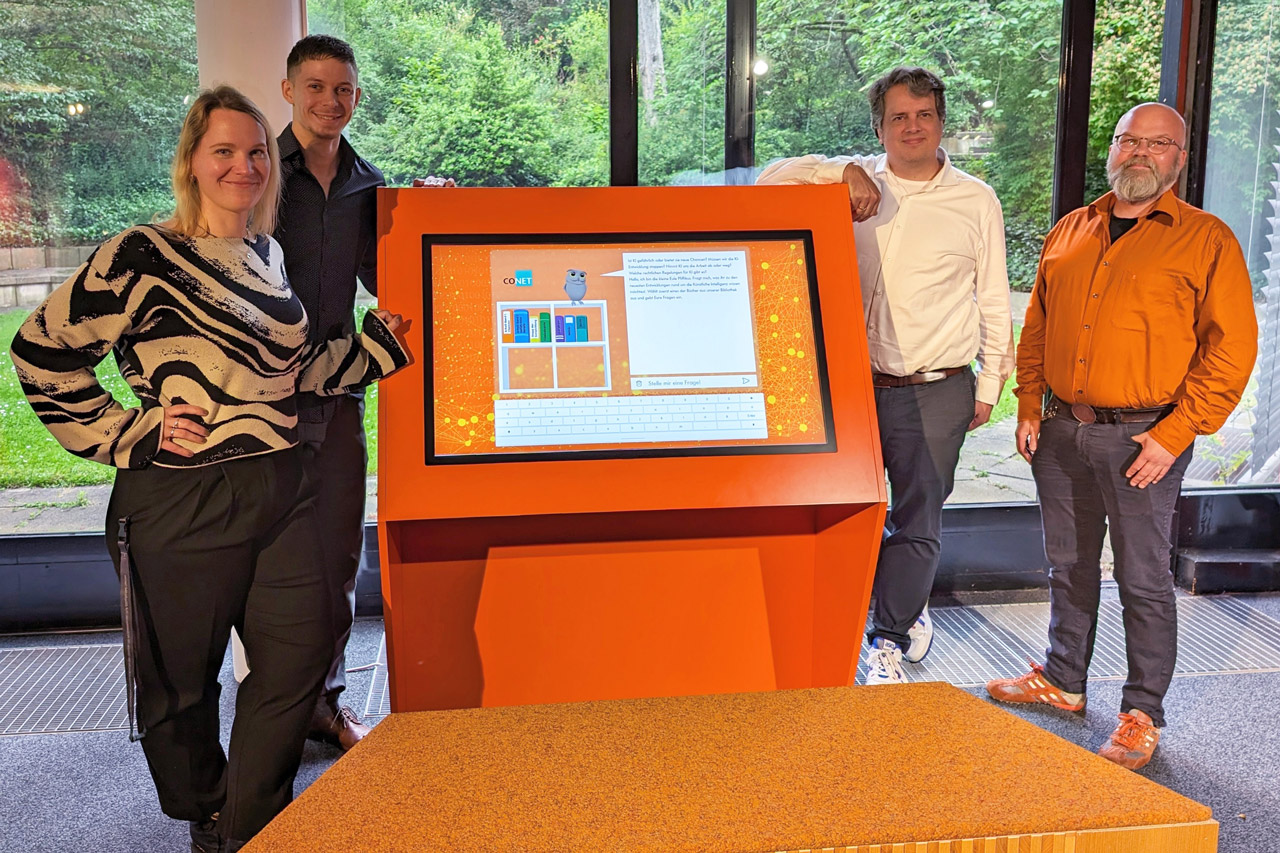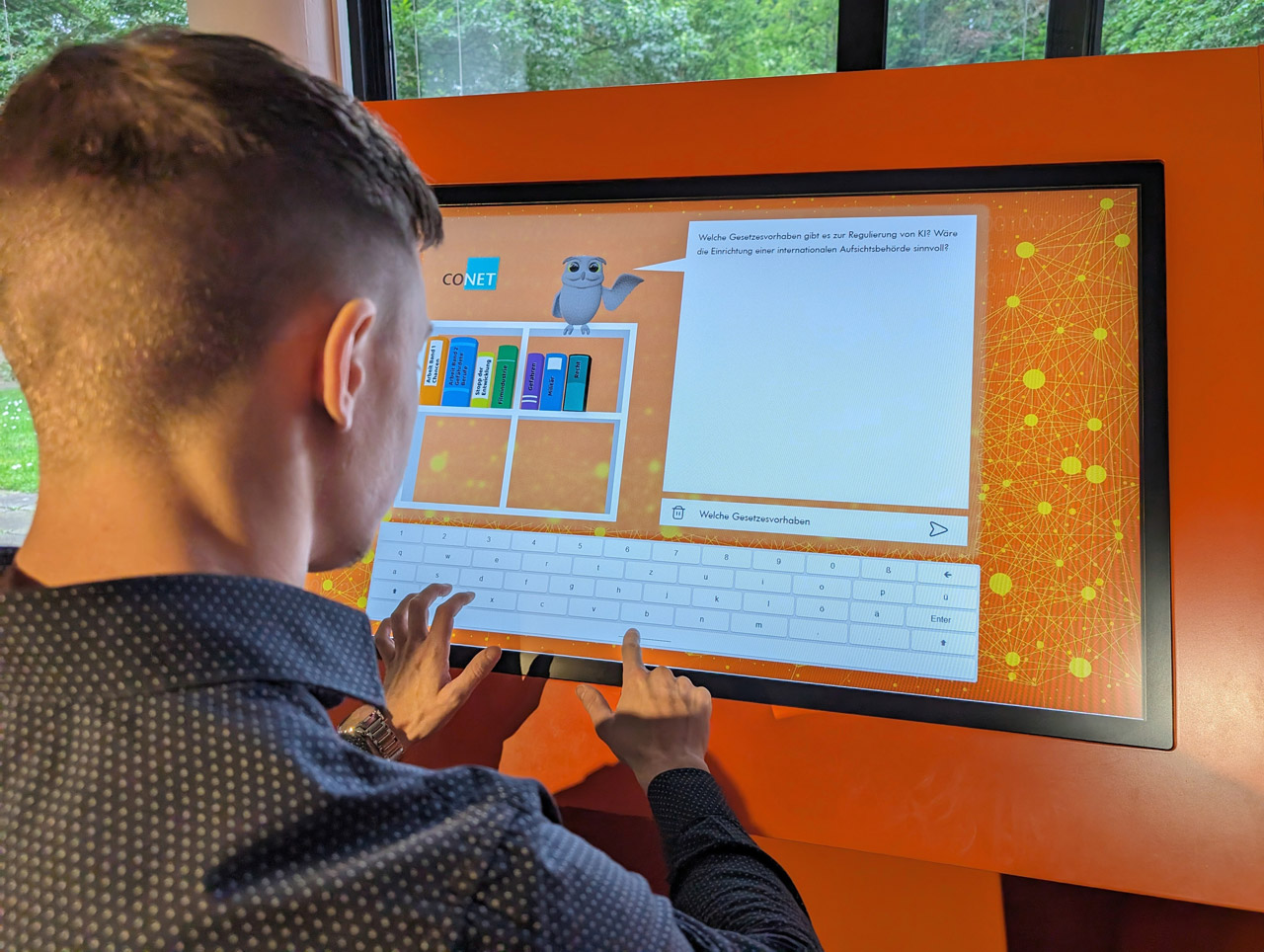
Visitors to the Deutsches Museum Bonn – Forum for Artificial Intelligence can look forward to a new attraction: Together with CONET, the museum has created a new exhibit based on the owl Pfiffikus – the mascot of the Deutsches Museum Bonn. With the help of generative AI (GenAI), Pfiffikus answers questions about current developments in the field of AI and thus makes an important contribution to museum communication work.
Table of contents
Adventure site “Mission AI”
The Deutsches Museum Bonn has reinvented itself in recent years and developed into a forum for artificial intelligence. Under the motto “Mission AI – experience.understand.help shape”, an experience location was created that conveys the opportunities, risks and challenges of the key technology of the 21st century in an interactive and entertaining way. In keeping with this, there has been a new exhibit since April, in which the Bonn-based IT consultancy CONET has been involved: the chatbot Eule Pfiffikus on the current AI discourse.
Owl Pfiffikus answers questions about AI with the help of GenAI
Visitors can use a screen to find out about various current AI topics. To do so, they select “books” from a virtual cupboard that contain topics such as: “Endangered professions”, “Stop development”, “Military” or “Law”. Once a book has been selected, questions can be asked about it, such as “Which professions are threatened by artificial intelligence?” The owl Pfiffikus answers the questions automatically based on the information on the individual book topics compiled by the museum team. To do this, it uses a so-called Large Language Model (LLM) in the form of ChatGPT 3.5 Turbo. With this language model, the CONET AI professionals have trained the owl to give accurate and authentic answers with a human character.
The project participants from left to right: Dana Vlcek (Deutsches Museum Bonn), Dominik Bruski and Philipp Leusmann (CONET) and Ralph Burmester (Deutsches Museum Bonn)
“GenAI is now used in a variety of areas and supports people in their everyday and professional lives. As with new forms of media, handling and understanding must first be learned. Projects like the Pfiffikus owl are therefore particularly important because they familiarize people with new technologies in a very simple way, reduce any possible fears or obstacles and pave the way for other areas of application,” says Philipp Leusmann, Head of Data Analytics & AI at CONET.
Artificial Intelligence with CONET
We use artificial intelligence to increase your operational efficiency through automated processes and data-driven decision-making and to increase your customer satisfaction.
About our services
“In our exhibition 'Mission AI', visitors get to know artificial intelligence in many different facets. From the functional principle of artificial neural networks to deepfake applications and the latest examples of generative AI. But we also wanted to have a central location in the museum that reflects the current discourse on AI. So, in a creative exchange with the CONET team, we came up with the idea of combining a chatbot application with our owl Pfiffikus. This way, our visitors always stay up to date with the latest AI developments and can experience the use of generative AI in a pleasant way,” explains Ralph Burmester, exhibition curator at the Deutsches Museum Bonn. His colleague, education volunteer Dana Vlcek, adds: “We are more than satisfied with CONET's implementation. The exhibit meets our technical and content-related expectations and, more importantly, it is very well received by the public.”

Visitors can enter AI-related questions that will be answered by the owl Pfiffikus.
CONET will continue to support the project and expand its scope with new books. The responsible AI team will also take care of maintenance and further development – for example, an update to a newer version of ChatGPT for even more human responses is conceivable.
Cultural innovation through GenAI: tradition meets technology
Generative artificial intelligence is increasingly being used in cultural fields, especially in museums. For example, it makes it possible to digitally reconstruct and preserve historical artifacts and works of art, allowing damaged or incomplete works to be virtually restored. GenAI can also create immersive experiences by developing interactive exhibitions and virtual tours that allow visitors to engage with the exhibits in a deeper and more direct way. For example, exhibits can be viewed from a shorter distance or from different angles without being compromised by the proximity of many visitors. In this way, GenAI makes museums more accessible and attractive to a wider audience and promotes cultural education in innovative ways.
Artificial Intelligence with CONET
We use artificial intelligence to increase your operational efficiency through automated processes and data-driven decision-making and to increase your customer satisfaction.
About our services

Niklas Ludwig has been Communication Manager at CONET since March 2020 and is responsible for the internal and external communications of the CONET group of companies.
Source: https://www.conet.de/blog/kuenstliche-intelligenz-trifft-kultur-conet-stattet-eule-pfiffikus-im-deutschen-museum-bonn-mit-genai-aus/


